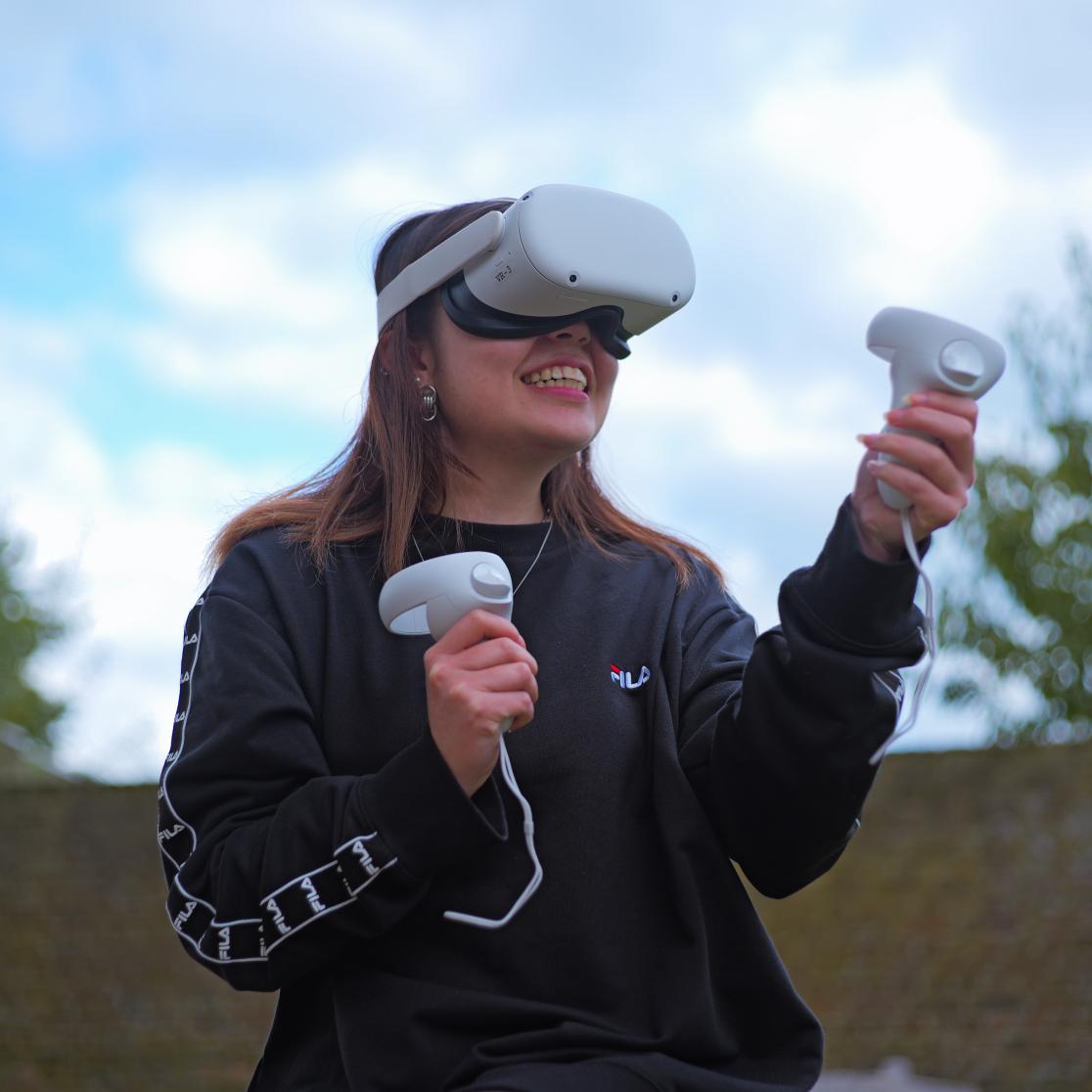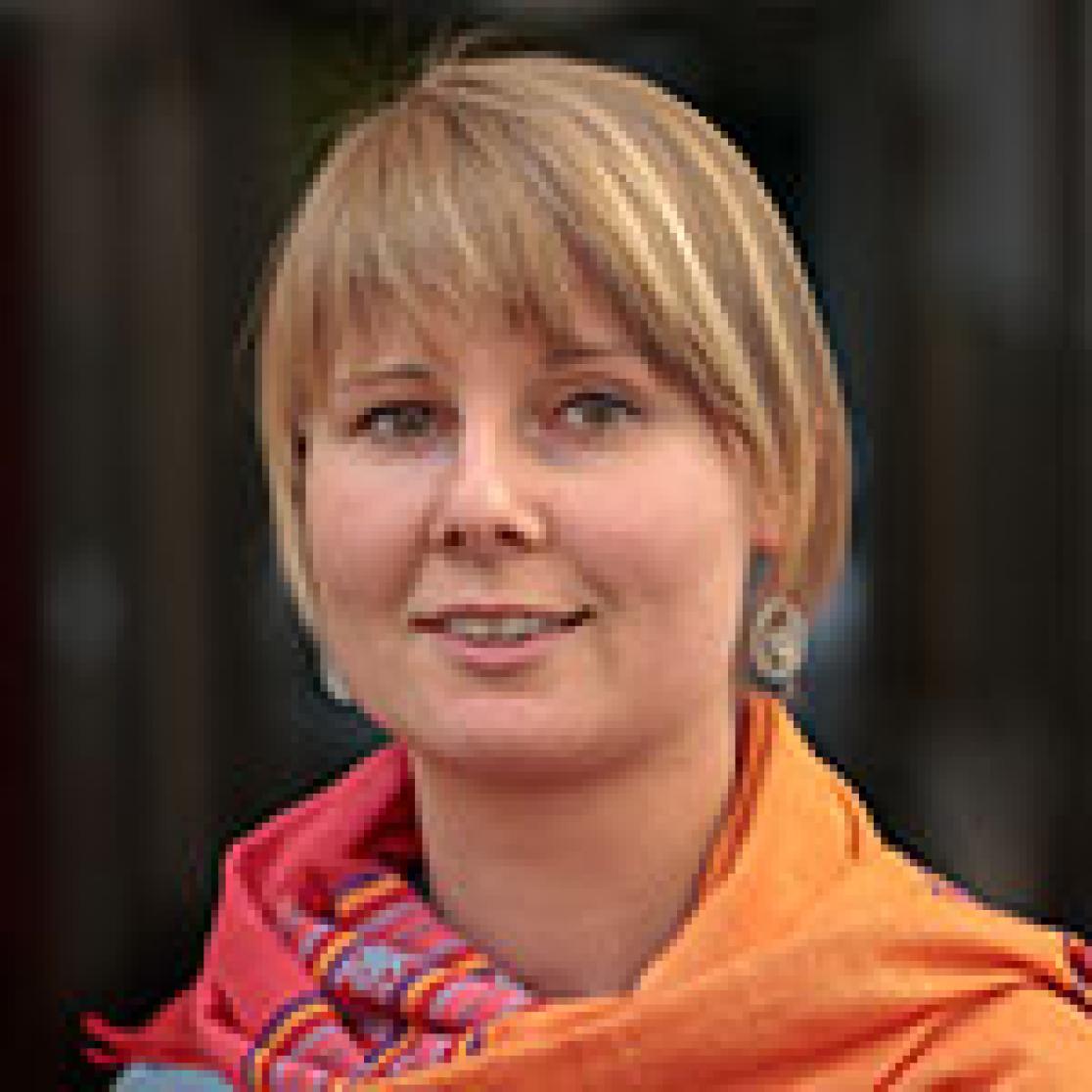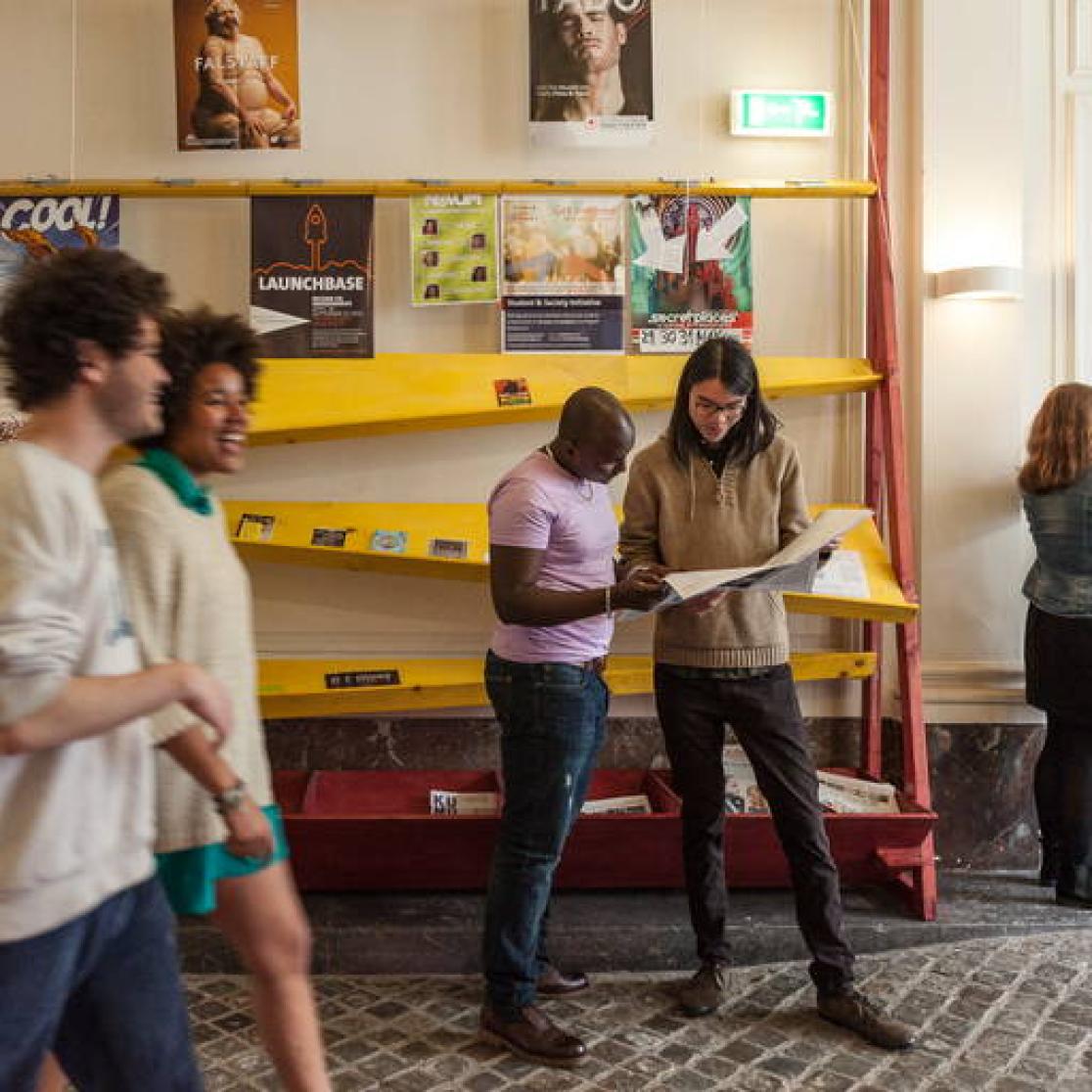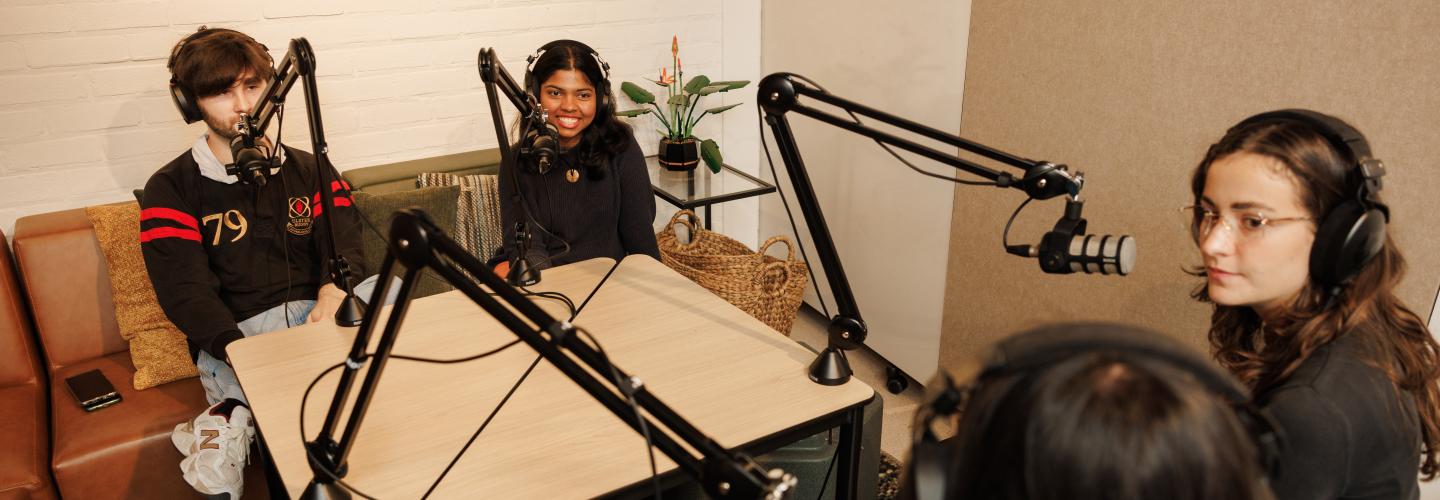Why this programme
Digital media are continuously co-shaping how we live, work, and connect, with technologies like artificial intelligence (AI) and algorithm-driven platforms currently at the forefront. From the spread of disinformation to the transformative potential of extended reality, digital media are both driving positive social change and presenting intricate challenges.
The MA MS:DC programme supports students in critically and creatively combining the skills and knowledge needed to engage with digital cultures and media technologies. Thereby, we train reflective, resilient, and forward-looking media professionals and researchers, dedicated to fostering inclusive and sustainable digital cultures.
Are you interested in the following questions? These are examples for issues you will examine in this MA.
- How can we navigate the ethical challenges of (generative) artificialintelligence?
- How does digitalisation affect our experiences of reality?
- What role do social media and digital platforms play in shaping politics, identity, and culture today?
- How can digital creativity spark new forms of art, activism, and community-building?
- How do we balance innovation with responsibility in a world driven by algorithms and big data?
- How can 3D modelling inspire new means of digital storytelling and heritage formation?
Programme highlights
- a timely and relevant field of study, addressing pressing societal issues
- connecting theory, methods, and hands-on media practices
- training reflective, resilient, and forward-looking media professionals and researchers, dedicated to fostering inclusive and sustainable digital cultureschoice of academic thesis, or an internship with empirical research and a shorter internship thesis
- specialised, committed, and accessible staff

This programme is unique in four main regards
- The MA pursues an integrative approach to theory, methods, and media skills: It combines theory, critical thinking and reflection with hands-on media practices and creative making. Our students benefit particularly from the programme’s media research expertise and attention to normative issues, equipping them with a moral compass and transferable skills through practice-based engagement with media.
- We offer you an interdisciplinary curriculum: With its interdisciplinary approach to media studies, this media studies programme combines research from multiple disciplines, such as philosophy, sociology, gender studies, and science and technology studies, notably drawing on the broader fields of (digital) humanities and qualitative social sciences.
- The programme combines traditional, qualitative methods and digital methods: The MA MS:DC brings together qualitative social sciences methods such as interviewing with qualitative, digital methods like digital ethnography and more quantitatively oriented distant reading techniques.
- We allow you to learn actively, in constructive, contextual, self-directed, and collaborative ways: UM’s problem-based learning (PBL) approach allows you to proactively develop and independently apply skills and knowledge. Our students value PBL as an active form of learning that deepens their knowledge and skills: our courses combine problem-based learning with project-based learning, letting you engage in independent, yet tutor-guided project development and problem-solving.
Do you have questions about the programme? Feel free to reach out to our Programme Director, Annika Richterich.

What will you learn?
In tutorial groups of approximately 15 students, you will seek solutions to tackle concrete, real-world issues, problems and scenarios in digital cultures. You will explore topics such as: digital media and ethics; virtuality and mediated experiences; design thinking maker culture, and social justice; digital methods, data feminism, and postcolonial theory; new public spheres; you will learn more about archiving and digital collections, whilst engaging incollaborative problem solving, digital storytelling and narratives, and , 3D (re)creation. Our teachers are highly specialised yet approachable and engaged: they act as facilitators, providing assistance if needed, at the same time allowing you to develop the independence and problem-solving skills that you will need in the field.
The programme has a broad and interdisciplinary theoretical foundation, combining Media Studies with fields such as Digital Humanities, Philosophy of Technology, , Design, and Digital Sociology.
The programme melds theory and digital research skills through a variety of modalities, including hands-on skills training, group projects, scenarios and case studies. You can further develop your professional skills if you choose to write your master’s thesis in combination with an internship.
Customise your programme
All students write a thesis in the second semester. You can decide whether to follow a more in-depth academic trajectory, focussing solely on your thesis, or choose an internship during which you will also conduct empirical research at your internship provider and write a shorter internship thesis.
Our students do internships at organisations in Limburg, such as the European Journalism Centre, FASHIONCLASH, Centre Ceramique, the Jan van Eyck Academie, or the Discovery Museum. Some also opt for digital culture-related internships elsewhere in the Netherlands, for example the Netherlands Institute for Sound and Vision (Hilversum), EyeEm (Berlin), in small to medium technology enterprises, or in the media and communications departments of large companies.
Your mentors
Media Studies: Digital Cultures is a small programme of 20 to 35 students. This allows you to get to know your professors and to become part of FASoS’ close-knit academic and creative community. Their doors are always open, and they enjoy getting to know you and your work: they are highly specialised, all researching topics and issues relevant in the programme too.
Dr. Annika Richterich
Programme Director
Dr. Monika Barget
Dr. Joeri Bruyninckx
Dr. Ike Kamphof
Dr. Costas Papadopoulos
Prof. Susan Schreibman
Dr. Karin Wenz
Dr. Denise Petzold
Dr. Sara de Vuyst
Skills training
The Media Studies: Digital Cultures programme also teaches you media and technology skills within contextualised, practice-based settings so you can be an active participant in the new media landscape. Under the guidance of our staff, you will:
- Present research for a broader audience via the creation of digital collections, podcasts, and videos
- Work in international teams on research, creative design challenges,and media production
- Learn and put into practice design thinking and project management skills
- Acquire skills to create 3D artefacts and engage digital narratives
- Engage with analogue technology and reflect on experiencing unfamiliar technologies
International experience
Maastricht University is focused on the development of its international classroom, a place where our differences become our strengths. From day one, you will be challenged with differing viewpoints and experiences as you interact with staff and students from all over the world. Your worldview will be enhanced by this interaction, bringing you closer to the programme’s goal of teaching students not only facts and concepts but also international accessibility and understanding. The Media Studies: Digital Cultures programme has always enjoyed great diversity. Beyond the Netherlands, students enrolling in the MA MS:DC come from diverse international backgrounds, such as Azerbaijan, Belgium, China, Germany, Taiwan, the US, the UK, to name just a few. Over the past 5 years, the programme had students from 11-24 nationalities each academic yearSuch diversity creates an international atmosphere that is strengthened by the international orientation of the programme.

Problem-Based Learning
As with many Maastricht University programmes, the Media Studies: Digital Cultures master’s programme is taught using Problem-Based Learning (PBL). In tutorial groups of 12 to 15 students, you seek solutions to concrete ‘problems’ taken from situations involving current issues in digital cultures such as issues around generative intelligence, mediated experiences, questions of justice in digital design, digital methods, digital ethics, and developments in digital heritage, .. The programme uses project-based learning, a variant of PBL: project-based learning involves students in projects, like the creation of a digital collection or collaborative wireframing and mock-up development during a design sprint. They learn and create, independently and in groups, taking ownership of their ideas and creations as well as responsibility for their contributions. With the help of problem- and project-based learning, the programme fosters critical as much as creative thinking, training students to become not only reflective researchers but also prepare them as proactive future media professionals. This allows you to develop the independence and problem-solving skills that you will need in the field.
PREMIUM honours programme
PREMIUM is our Honours programme for high-performing master’s students. If selected, you will work in an interdisciplinary team on a project for a real client from the public or private sector (e.g. Cisco, DHL, EcoAct). Along with guidance from a project mentor, you will receive individual coaching focused on your personal and professional development. You will also attend several workshops and events designed to cultivate valuable knowledge and skills, as well as build a network that provides you with the best preparation possible for the job market.
Are you up for the PREMIUM challenge?

